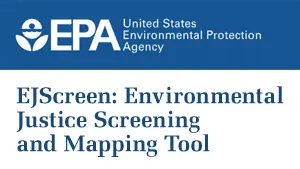 EJScreen is EPA’s environmental justice mapping and screening tool that provides EPA with a nationally consistent dataset and approach for combining environmental and socioeconomic indicators.
EJScreen is EPA’s environmental justice mapping and screening tool that provides EPA with a nationally consistent dataset and approach for combining environmental and socioeconomic indicators.
EJScreen users choose a geographic area; the tool then provides socioeconomic and environmental information for that area. All of the EJScreen indicators are publicly-available data. EJScreen simply provides a way to display this information and includes a method for combining environmental and socioeconomic indicators into EJ and supplemental indexes.
EJScreen includes:
Each EJ and supplemental index combines socioeconomic indicators with a single environmental indicator. The tool provides a number of capabilities including:
- Color coded mapping
- The ability to generate a standard report for a selected area
- Comparisons showing how a selected area compares to the state or the nation
EJScreen users should note there is substantial uncertainty in socioeconomic and environmental data, particularly when looking at small geographic areas. EJScreen is not intended to provide a risk assessment. Also, EJScreen does not provide data on every environmental impact and socioeconomic indicator that may be relevant to a particular location, and data may be several years old. Screening results should be supplemented with additional information and local knowledge to get a better understanding of the issues in a selected location. It is important to understand the caveats and limitations when using EJScreen.
Click here to view the resource.




